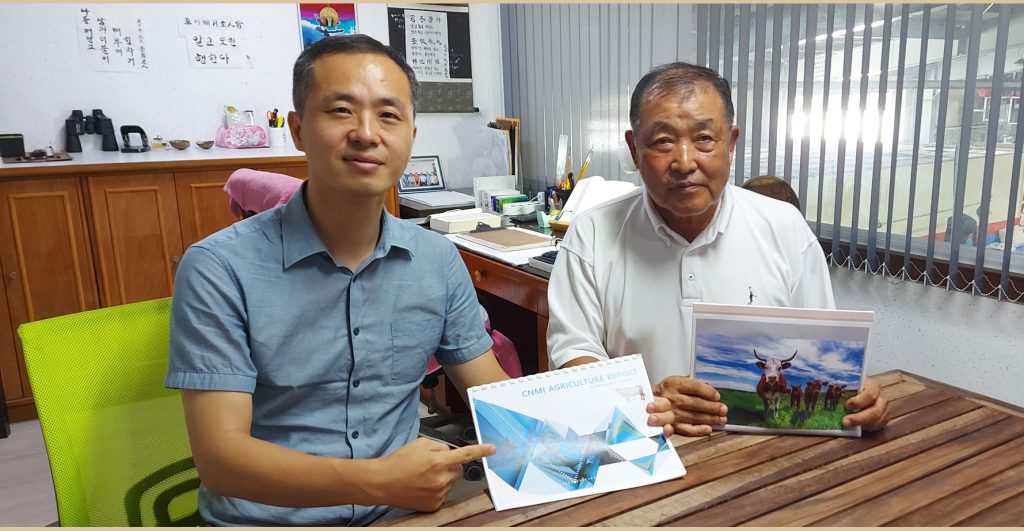Marianas Meat aims to revive CNMI meat industry

Marianas Meat sales manager Kim Sung Hun and P&A Corp. chair Hong Kyun Kim are laying the groundwork to help revitalize the CNMI economy by jumpstarting the meat and agriculture industry on Saipan. (BEA CABRERA)
P&A Corp., which owns and operates Marianas Meat, believes that sustaining agriculture in the CNMI will not only allow the CNMI weather the ebbs and flows of the tourism industry but will also ensure greater food security for the islands.
At least that’s what MM sales manager Kim Sung Hun believes in. “…If the CNMI will only rely on the tourism business, we cannot survive in times like the pandemic. We have seen and experienced it. Another industry that has potential and can thrive in the CNMI is the agricultural business. This also tackles food security for all the islands and we need the government to make this as a priority,” he said.
Toward this end, Marianas Meat recently resumed operations after a year of hiatus due to COVID-19 concerns. Hun said that P&A Corp. bought this company 10 years ago and it underwent many challenges and difficulties but now the timing to reopen is perfect, with the pandemic showing people what can be done to make the CNMI economy more resilient.
He said it is the vision of P&A Corp. chair Hong Kyun Kim to help develop a hundred CNMI farmers that can help supply the food needs and requirements of the community in the future.
“With this goal, we want to develop 100 farmers and help them make money in the agricultural industry and provide the CNMI safe and healthy meat that is locally produced because we are currently still importing all our meat frozen from overseas,” he added.
Kim said that Marianas Meat products are U.S. Department of Agriculture-approved. “Ever since we took over management and operations, we are USDA-certified and inspections have been done regularly. At the start of the pandemic, we stopped operations and we used this time to study how can we make the meat business in the CNMI a success. Currently, we are successful in raising healthy pigs,” Hun said.
Before its recent hiatus, Marianas Meat would supply meat to hotels and restaurants, then it started supplying meat to the community via the public market at the Garapan Fishing Base. Right now, the company supplies meat to the Winner’ Fresh Meat Market in Garapan across Garapan Elementary School.
“During Marianas Meat’s closure, we experienced financial losses but, to keep the business active, P&A chairman Kim would get funding from his other businesses because he strongly believes that the goal to develop 100 farmers will make this and the livelihood of the farmers a success,” Hun said.
According to Hun, if they are able to reach out, support, and help educate 100 farmers with new farming techniques, the agriculture sector in the CNMI will grow and its meat industry will flourish because Marianas Meat will eventually buy from them.
In a study that Marianas Meat conducted on this subject, they learned that developing the local livestock will also have positive economic, social, and environmental impacts. “If we develop our domestic livestock, it will contribute to people’s income, farmers will be able to use grass instead of feed to have low-cost production method, the CNMI will be able to manage lands by utilizing idle lands, we will be more equipped to respond to global economic changes and come up with measures to revitalize the domestic economy and consider farming as a good source of household income,” Hun said. “Health-wise, grazing livestock is very beneficial because grass-fed meat is rich in minerals, vitamins and omega 3 that slows aging and promotes good health. …When it comes to environmental benefits, grazing livestock will greatly contribute to keeping the soil healthy by recycling grass cultivation using livestock manure, protects grass species and prevents soil collapse brought about by natural disasters, helps revitalize green areas and promote ‘fertilization effect and forest firewall and help eliminate soil erosion and protects water resources.”
Hun said that aside from their desire to work with farmers and ranchers, they support government and elected officials’ initiatives to promote buying local and initiatives taken to strengthen food security in the CNMI. “…If we develop the agricultural industry, then we do not have to rely on the tourism industry alone. …We have what it takes as we have access to an expansive Asian market, government support, stable U.S. financial and legal system and this could open up other opportunities such as installation of new telecommunication infrastructure for online market development.”
“…We support the production industry at the national level while helping revitalize the CNMI domestic economy. … Agriculture will help the CNMI economy—if we provide meat locally then this will help in the CNMI’s economic growth,” Hun added.



























